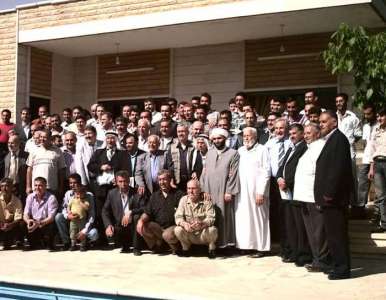The tragedy of Arab nationalist thought lies in the inability of Arab nationalists to translate it into practical implementation, despite the fact that many contemporary leftist parties and movements began with a nationalist vision in their broader political outlook. The liberation of the Arab world is inseparable from the liberation of Palestine, and vice versa; the two are dialectically interlinked in relation to many crucial issues affecting the fate of the region’s nations.
Saeeda (Antoun Saadeh) viewed the Arab world through the lens of practical Arabism, not an imaginary or idealized Arabism. He considered the Arab world as composed of four principal nations: the Arabian Peninsula, the Nile Valley, the Maghreb, and Syria. Each nation possesses its own historical cohesion, common characteristics, and specific challenges. Therefore, each nation must rise on its own, uniting its proximate peoples to become strong by reinforcing shared history and common traits, which helps restore its past glory. When each Arab nation attains such unity, it naturally leads to a unified Arab front against common threats.
We see here the futility of the claims made against Saeeda with manufactured absurdity, suggesting that colonial powers supported him to combat Arabism. Is this claim mere folly, or an underestimation of the intelligence of both the region’s intellectuals and its general populace? No one confronted French colonialism as effectively as Saeeda. No one countered Zionist claims with as much rigor as Saeeda and the Syrian nationalists, who sacrificed many martyrs for independence and resistance against occupation.
Saeeda’s foresight and exceptional judgment enabled him to see what others could not. A key example of his vision is the failed Syrian-Egyptian union, which occurred over two decades after his death. Anyone who studies Saeeda’s works would know that, had he been present, he would have predicted its inevitable failure. Likewise, the failed nationalizations and imported socialism of that period ignored the historical conditions of the countries in which they were implemented. The union failed because it did not account for the fundamental differences between Syrian and Egyptian nature and economies, resulting in inevitable separation.
Today, we must rethink our ideas, move beyond the illusions we live in, and develop solutions to our problems based on rationality rather than emotion. Arab nationalism today resides in the unity of the Arab street. But what does this mean? Is it simply because people speak Arabic, as some—like Islamic parties—claim? Certainly not. Is it because of a shared origin? Again, no, as the peoples of the Arab world belong to four distinct constituent nations. Is it due to a common history, traditions, or social bonds? Also no. The unifying factor today is a shared goal and interest: to eliminate global imperialism, which controls the resources and wealth of the Arab region, and to eradicate Zionism, the cancer entrenched in the Arab world, threatening its interests across the board.
To act effectively, unity is essential. To achieve unity, we need a comprehensive ideology that encompasses all sectors of Arab society. Today, this struggle against imperialism and Zionism also brings together non-Arabic-speaking countries such as Iran, Pakistan, and former Persian states, as well as some African countries. This elevates the conflict to a global level, not merely a regional one, necessitating an ideology that unites these forces while maintaining the broader Arab base.
Hassan Safwan Dalati
2009-07-23



